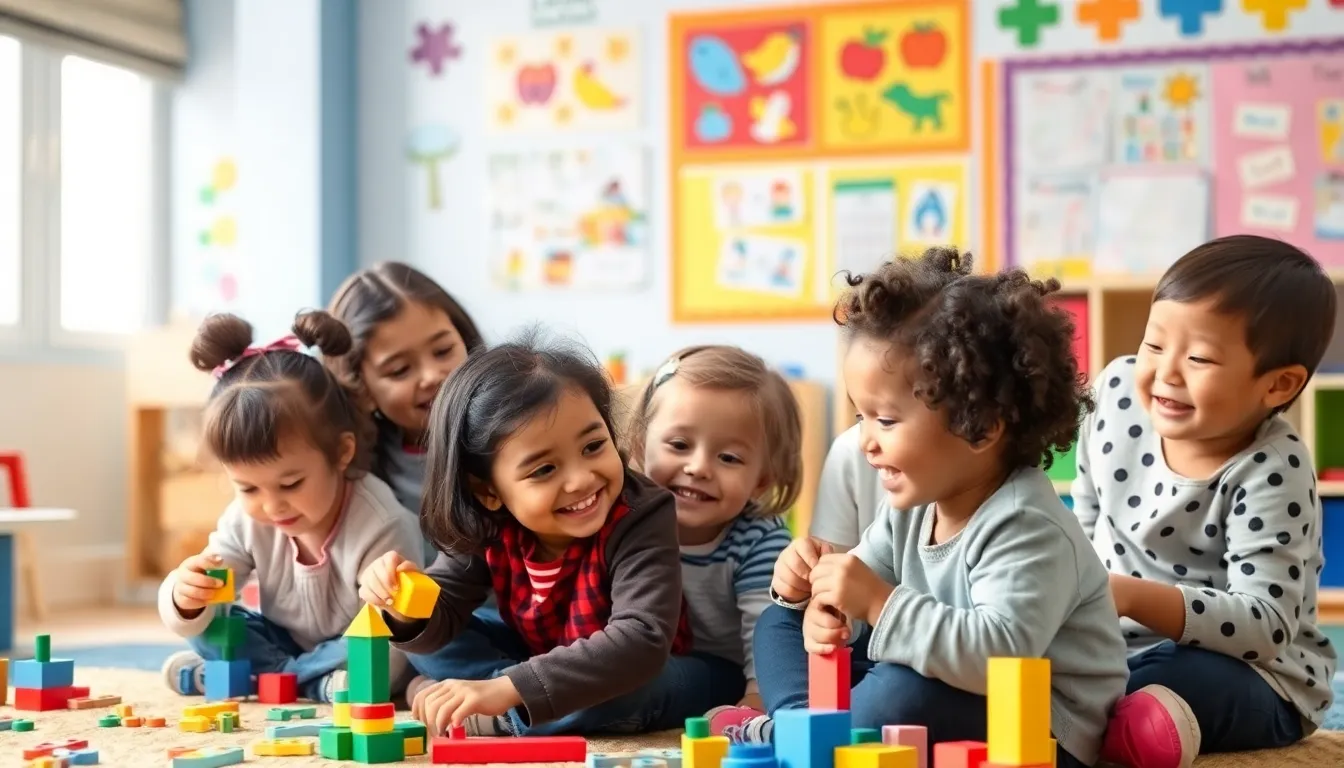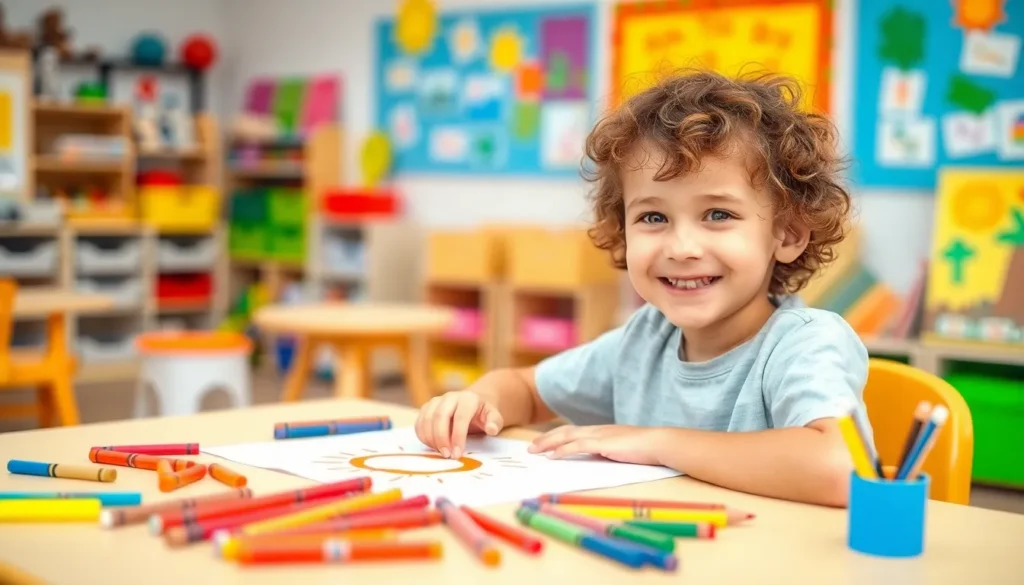Table of Contents
ToggleIn the whimsical world of preschool education, tiny hands wield crayons like swords and imaginations run wild. It’s not just about learning the ABCs and 123s; it’s a delightful adventure where kids discover the joys of sharing, creativity, and the occasional snack break. Parents often wonder if their little ones are ready for this magical journey, and the answer is a resounding yes!
Preschool lays the foundation for lifelong learning, nurturing curiosity and social skills while keeping things fun. Picture a place where laughter fills the air and friendships bloom over finger painting. With the right preschool, children aren’t just prepared for kindergarten; they’re set to conquer the world—one snack at a time! So buckle up and get ready to explore the enchanting realm of preschool education, where every day is an opportunity for discovery and growth.
Overview Of Preschool Education
Preschool education serves as a critical foundation for children’s development. It introduces young learners to structured environments that nurture curiosity and creativity. Programs typically cater to children aged 3 to 5, focusing on both academic and social skills.
Curriculum designs emphasize play-based learning, which is vital for young children’s engagement. Activities often include storytelling, art projects, and group games. These experiences encourage children to explore different concepts while developing teamwork and communication abilities.
Socialization occurs naturally in preschool settings. Through interaction with peers, children learn sharing, empathy, and conflict resolution. Teachers facilitate activities that promote these essential social skills, ensuring children feel secure and valued.
Academic readiness in preschool involves more than just learning letters and numbers. It encompasses early literacy and numeracy skills, alongside critical thinking and problem-solving abilities. Engaging in puzzles, songs, and rhymes strengthens cognitive development.
Emotional growth plays a significant role in preschool education. Children develop self-regulation through structured routines and positive reinforcement. By recognizing their emotions, they gain confidence and resilience in various situations.
Parental involvement enhances preschool experiences. Regular communication between families and educators fosters a supportive learning community. Parents can participate in activities, adding to their child’s development and overall educational journey.
Preschool education equips children with the necessary tools for success in kindergarten and beyond. As they transition into primary education, the skills acquired during preschool help them adapt to new challenges. Overall, this transformative phase lays the groundwork for lifelong learning and personal growth.
Importance Of Early Childhood Education

Early childhood education plays a crucial role in shaping a child’s future. Preschool lays the groundwork for academic success and overall development.
Cognitive Development Benefits
Cognitive development benefits arise significantly during preschool years. Engaging activities encourage critical thinking, creativity, and problem-solving skills. Children learn to ask questions, explore their interests, and connect ideas. Incorporating play-based learning enhances memory retention and language skills. Interactive lessons with puzzles, songs, and stories stimulate curiosity and imagination. Research shows that early exposure to structured learning can improve long-term educational outcomes. Activities tailored to young learners support brain development, making this stage vital for their cognitive growth.
Social Skills Enhancement
Social skills enhancement occurs naturally within preschool settings. Children learn to communicate effectively and build friendships through play and interaction. They practice sharing, listening, and taking turns during group activities. Opportunities for collaboration develop empathy and conflict resolution abilities. Preschool environments act as safe spaces for children to express their feelings and understand others’ emotions. Moreover, these interactions help decrease anxiety and boost confidence during future social encounters. Overall, establishing these foundational skills in preschool benefits children’s social competence throughout their lives.
Types Of Preschool Education Programs
Various preschool education programs cater to diverse learning styles and developmental needs. Each approach emphasizes unique methodologies to cultivate readiness for future education.
Montessori Method
The Montessori Method emphasizes child-led learning within a prepared environment. In this approach, classrooms contain engaging materials that promote exploration. Children learn at their own pace, developing independence and self-discipline. Teachers act as guides rather than instructors, observing and supporting each child’s interests. Activities, such as practical life exercises and sensory projects, enhance fine motor skills and cognitive development.
Reggio Emilia Approach
The Reggio Emilia Approach centers on the child’s interests as the foundation for learning. Education occurs through projects that encourage critical thinking and collaboration. Classrooms foster creativity, with materials readily accessible for hands-on experiences. Teachers and parents actively participate, forming a community that values communication and multiple perspectives. Documentation of children’s work illustrates their learning journey, highlighting their expression through various mediums.
Traditional Preschool Education
Traditional preschool education follows structured curricula focusing on core subjects. Programs typically include circle time, storytelling, and organized play. Educators provide direct instruction on foundational skills, such as letters and numbers. Classroom routines help children adapt to school environments, promoting socialization and teamwork. This approach emphasizes a balanced mix of play and academics, reinforcing essential skills for future learning.
Key Factors To Consider When Choosing A Preschool
Selecting the right preschool involves several key considerations that significantly impact a child’s early education experience.
Curriculum and Teaching Methods
Explore the curriculum options offered by different preschools. Play-based learning enriches children’s experiences by engaging them in hands-on activities, fostering creativity and critical thinking. Look for programs that balance academic skills with social development. Montessori schools focus on self-discovery in prepared environments, while Reggio Emilia emphasizes collaborative projects driven by children’s interests. Structured curricula in traditional preschools offer a mix of play and academic learning, reinforcing foundational skills needed for kindergarten. Inquire about specific teaching methods to assess which aligns best with a child’s unique learning style.
Teacher Qualifications
Evaluate the qualifications of teachers in prospective preschools. Education in early childhood development and relevant certifications ensure educators possess the necessary skills to foster growth in young learners. Experienced teachers often create enriching learning environments that encourage exploration and curiosity. Additionally, ongoing professional development keeps educators updated on effective teaching practices. Consider the teacher-to-student ratio, as smaller groups enable more personalized attention, enhancing individual development. Understanding the educators’ backgrounds contributes to finding the right fit for a child’s preschool experience.
Challenges In Preschool Education
Challenges in preschool education impact the effectiveness of early childhood programs. Several key areas require attention to enhance the overall experience.
Funding and Resources
Funding plays a crucial role in the delivery of preschool education. Limited financial resources affect the availability and quality of programs. Many preschools depend on government support or private donations to maintain operations. Insufficient funds hinder access to educational materials, training for educators, and proper facilities. Statistics indicate that only 40% of preschool programs operate at a fully funded level, resulting in budget cuts that compromise quality. Consequently, some institutions struggle to meet developmental needs. Communities often face disparities in resource distribution, causing variations in educational quality among different areas.
Access and Equity Issues
Access and equity issues present significant challenges in preschool education. Economic barriers prevent many families from enrolling their children in quality programs. Reports show that children from low-income households are less likely to attend preschool, with only 60% participating compared to their more affluent peers. Geographic location influences access, as rural areas may have fewer options than urban centers. Additionally, cultural and linguistic differences can create obstacles for diverse populations. These inequities result in gaps in foundational skills among children. Addressing these challenges ensures all children receive an equal opportunity to thrive in early education settings.
Preschool education plays a vital role in shaping a child’s future. It provides a nurturing environment where curiosity and creativity flourish. Through engaging activities and social interactions, children develop essential skills that lay the groundwork for academic and personal success.
Parents play an integral part in this journey by selecting the right preschool that aligns with their child’s needs. Understanding the various educational approaches can help families make informed decisions.
Addressing challenges in preschool access and funding is crucial to ensure that every child has the opportunity to thrive. As children embark on this exciting educational adventure, they’re not just preparing for kindergarten; they’re building a foundation for lifelong learning and growth.







